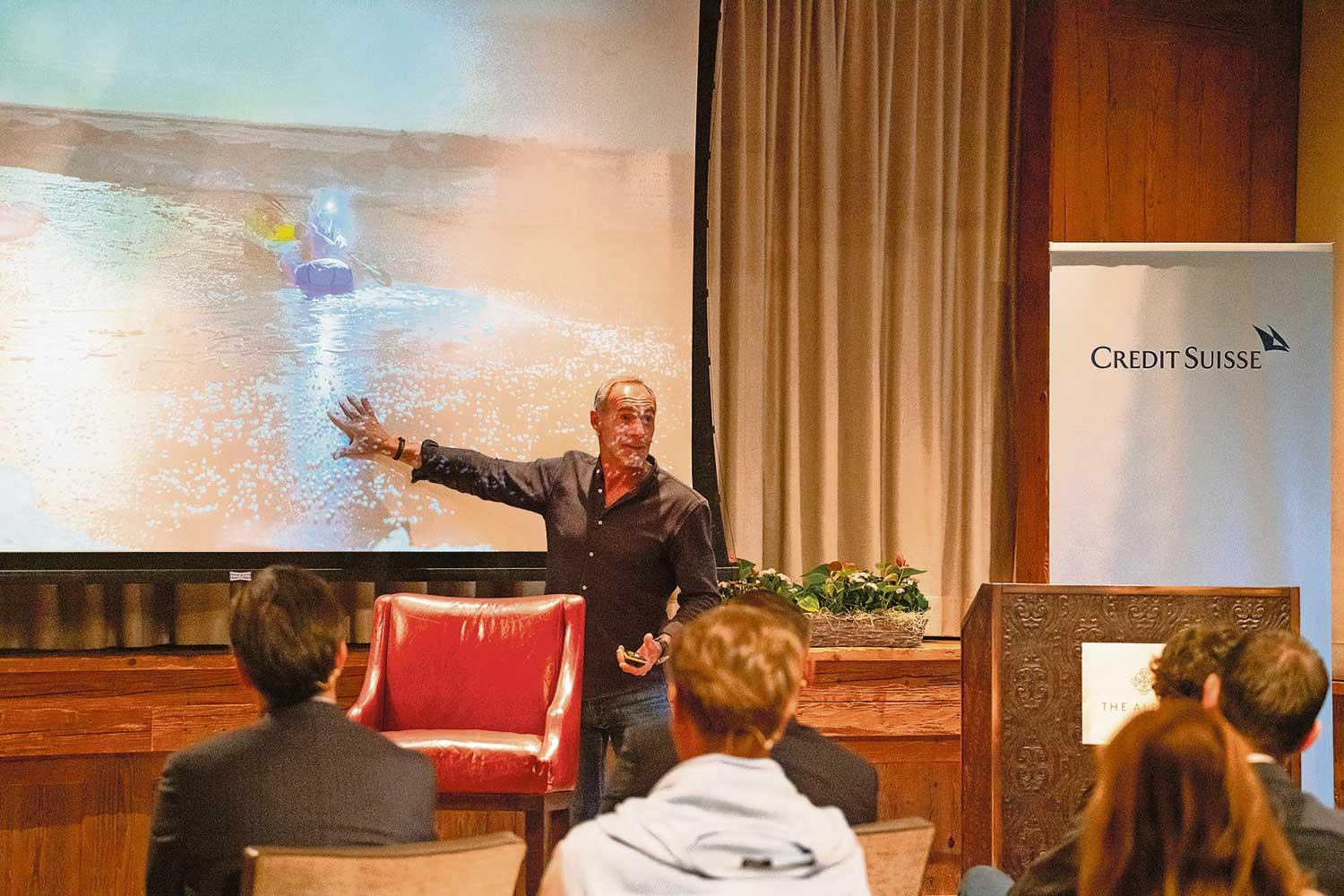Domino effect for responsible action from Gstaad into the world
27.09.2021 Local NewsImages and media reports of melting glaciers, rising sea levels, extreme storms and climate refugees go around the world every day. You have to be careful not to become jaded as a news consumer. When you meet people who have experienced the effects of global warming first-hand and report on them, the effect is different, the stories are more likely to prompt you to take action. This was the case at the Impact Investing event at The Alpina in Gstaad, where professional explorer Mike Horn spoke of a North Pole without polar bears.
Seen the world
South African-born Mike Horn lives in Château-d'Oex – when he is at home. The extreme sportsman devoted himself to voyages of discovery in 1991. Over the past thirty years, he has crossed the Atlantic several times in a sailboat, breaking world records in the process. He made expeditions to the Andes, the Himalayas, the North and South Poles and drove the Paris-Dakar race. He used every conceivable means of transport: on foot, on a bike, on skis, by boat, paraglider or simply in a 4×4. Kobi Reichen from Lauen accompanied him on some expeditions.
Together with the Norwegian explorer Børge Ousland, Mike Horn undertook a 60-day journey on skis without dogs or motorised means of transport during the Arctic night for the first time in 2006. From February to March, they towed pulks from Cape Articheski in Russia to the North Pole. For two months, the two hiked in complete darkness and sometimes on paper-thin ice. Back then, they often encountered polar bears. "Once, a polar bear even sat on my tent while he searched my food supplies," Horn joked at The Alpina.
When he returned to the same place in 2020, he was startled. Where 2.5-metre-thick pack ice floated on the water 14 years ago, the ice sheet was just eight centimetres thick and there were no more polar bears. Because they are not supported by the thin layer, they lack the basis for successful hunting. As a consequence, polar bears are increasingly approaching the mainland and threatening inhabited areas in their hunt for food. "This danger is man-made," Horn warns.
The pole as a window
Horn compared the North and South Poles to windows and doors that you open for ventilation when it gets stuffy in a room. Due to the immense layer of ice, the poles cool the Earth and provide a cold breeze. Although it still gets minus 40 degrees or less at the poles, pack ice no longer forms. The warmed up ocean acts like an oven. "As soon as the ice is missing, the Earth will warm up proportionally even faster than before."
Race for sustainable engines
To do something about the advancing climate change, Horn often participates in research expeditions that serve as the basis for new technologies. When he competed in the Paris-Dakar Rally with a vehicle that burned one litre of diesel per kilometre, he earned a lot of criticism. What many didn't know was that he equipped the Peugeot DKR with various measuring devices with which he measured engine power, brake pressure, engine temperatures, acceleration and speed. "Based on these performance standards, the aim is to develop a hydrogen-powered vehicle by 2023 that can compete with internal combustion engines in the most demanding rallies," he said, dealing a charming aside to Silent Yachts, a company owned by Michael Köhler, which develops yachts that run autonomously on solar power and batteries. "Whether hydrogen or batteries will win the race will soon become clear," Köhler countered from the floor. The development of batteries is far advanced, he said. New technologies are being researched that do not require rare earths. Whether with hydrogen or electricity, on a small or large scale, those present agreed that all efforts count towards a sustainable world.
When bankers talk about passion
In addition to Mike Horn and Michael Köhler, other speakers from the financial sector spoke as well as entrepreneurs, all of whom want to protect the future by striving for sustainable development. Marisa Drew, chief sustainability officer at Credit Suisse, led through the event with eloquence, knowledge and charm.
In the closing panel discussion, Mike Horn shook things up one more time: "Everyone is talking about monetary investment. I'm talking about investing in love, in passion, in our families, in nature. Instead of us moving towards each other, I observe the opposite." This idea of passion and love was taken up by the follow-up speakers, whether as clever rhetoric or a genuine statement remains to be seen. More convincing was Nachson Mimran's call to change the world with the behaviour of each individual.
Based on AvS/Blanca Burri




